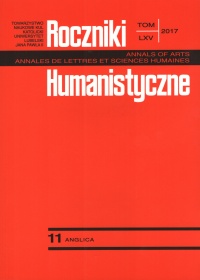The Power of Gaze: Some Remarks on the Orientalizing Perspective in Bharati Mukherjee’s Jasmine
Abstract
Bharati Mukherjee’s novel Jasmine has been frequently criticized for the Orientalizing representations of Indian women and India, which can perpetuate the stereotypical dichotomy between the East and West (violence and barbarism vs. peace and modernity). However, the analysis of the bidirectionality of gaze in the narrative, that is, the Westerners’ Orientalizing gaze cast on the protagonist (female immigrant from India) and, more importantly, the protagonist’s gaze back on Americans, can lead to a conclusion that reading the novel in terms of binary oppositions is not valid. In the very act of looking critically at American reality the protagonist denies the stereotypical image of an Oriental female (passive, silent, obedient). Moreover, a variety of representations of India and America are brought to the fore with a particular focus on how the image of America as the Promised Land is challenged.
References
Brewster, Anne. “A Critique of Bharati Mukherjee’s Celebratory Neo-Nationalism.” Journal of the South Pacific Association for Commonwealth Literature and Language Studies 34–35 (1993), http://www.eng.fju.edu.tw/worldlit/india/mukherjee_nationalism.htm. Accessed 15 Feb. 2014.
Cowart, David. Trailing Clouds: Immigrant Fiction in Contemporary America. Ithaca: Cornell University Press, 2006.
Dascalu, Christina. Imaginary Homelands of Writers in Exile: Salman Rushdie, Bharati Mukherjee and V.S. Naipaul. Youngstown, N.Y.: Cambria Press, 2007.
Foucault, Michel. Discipline and Punish: The Birth of the Prison. New York: Vintage Books, 1995.
Grewal, Inderpal. “Reading and Writing the South Asian Diaspora: Feminism and Nationalism in North America.” Our Feet Walk the Sky: Women of the South Asian Diaspora. Eds. The Women of South Asian Descent Collective. San Francisco: Aunt Lute Books, 1993. 226–236.
Grewal, Inderpal. Transnational America: Feminisms, Diasporas, Neoliberalisms. Durham, N.C.: Duke University Press, 2005.
Hoppe, John K. “The Technological Hybrid as Post-American: Cross-Cultural Genetics in Jasmine.” MELUS 24.4 (1999): 137–156.
Kimak, Izabella. Bicultural Bodies: A Study of South Asian American Women’s Literature. Frankfurt am Main: Peter Lang, 2013.
Kimak, Izabella. “Realism in Mukherjee’s Jasmine and Divakaruni’s The Mistress Of Spices: Two Renderings of Contemporary Asian American Immigrant Experience.” Lublin Studies in Modern Languages and Literature 32 (2008): 31–40, http://www.lsmll.umcs. lublin.pl. Accessed 10 Feb. 2014.
Loomba, Ania. Colonialism/ Postcolonialism. London and New York: Routledge, 1998.
Mukherjee, Bharati. “American Dreamer.” Mother Jones (January/February 1997), http://www.motherjones.com/politics/1997/01/american-dreamer. Accessed 15 Feb. 2014.
Mukherjee, Bharati. “Beyond Multiculturalism: Surviving the Nineties.” Journal of Modern Literature 20.1 (1996): 29–34.
Mukherjee, Bharati. Jasmine. London: Virago Press Limited, 1991.
Mukherjee, Bharati. “Two Ways to Belong in America.” New York Times, Sunday 22 Sept 1996. E13
Said, Edward. Orientalism. London: Penguin Books, 1978.
Copyright (c) 2017 Roczniki Humanistyczne

This work is licensed under a Creative Commons Attribution-NonCommercial-NoDerivatives 4.0 International License.





